Our Differences are Our Strengths
Neurodiversity in Theatre
You may ask yourself, What is an autistic doing working at language-based theatre companies? I often ask myself that question. But I believe that in theatre my “weakness” is one of my strengths.
If you see me walking down the street, I most likely have headphones on. I nearly always wear a blue T-shirt—V-neck, so nothing touches my neck. And I don’t wear coats or jackets when it’s cold out, which drives my wife crazy. I was late to speak, but I invented my own incredibly detailed sign language to communicate. I had speech therapy all through elementary school and occupational therapy all through middle school.
There is a tension between everything that I am and everything that might be conventional for an actor. This is the same tension that makes incredible theatre. No one wants to see something if it is too comfortable. Every performance should have a tension between what feels easy and what feels risky.
I am also legally blind—autism is often linked with vision or hearing problems—so I can’t perform very well in cold readings. If given a few days before an audition, I always memorize sides so I don’t read them off the page. I enlarge scripts so they are twice as big, just like all of my textbooks and tests were enlarged in school. I will often secretly record the first readthrough of a play on my cell phone, hidden in my pocket, so that I can learn my lines and study the script by listening; my eyes give out after about fifteen minutes of looking at a page. But because I know this, I get off book damn fast. Often before the first rehearsal.
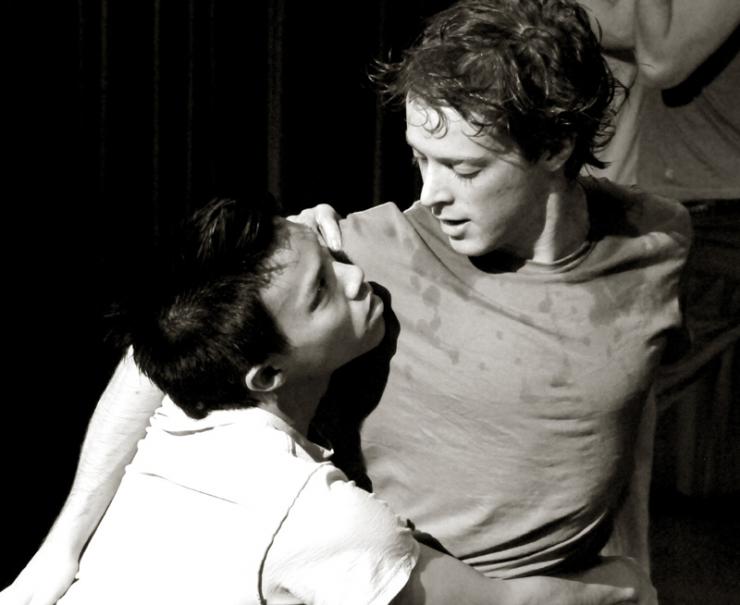
Autistics use scripts every day. We use scripting for daily situations that we can predict the outcome of, and we stick to those scripts. My job as an autistic is to make you believe that I am coming up with words on the spot, that this is spontaneous, the first time the conversation has ever happened in my life; this is also my job on stage as an actor.
For instance, at a coffee shop:
Me: Hi, how are you doing today? (Smile.) Can I please have a small coffee? Thank you so much! (If it seems like more conversation is needed.) Has it been busy today?
Barista: Any barista response.
Me: Oh yeah? Is it nicer when it’s busy or when it’s slow? Have a great rest of your day!
Always stick to the script. It makes things infinitely easier.
Or playing Edmund in King Lear:
Wherefore should I
Stand in the plague of custom, and permit
The curiosity of nations to deprive me...
When my dimensions are as well compact,
My mind as generous, and my shape as true...[?]
It’s really no different. They’re lines I’ve learned, that I say often, but I’m making you believe they are mine, particular to this specific moment.
These all may seem like reasons why I should never be an actor. But acting is a dichotomy. A tension between what is safe and what is dangerous. What is known and what is unknown. What’s mundane and what’s exciting.
There is a tension between everything that I am and everything that might be conventional for an actor. This is the same tension that makes incredible theatre. No one wants to see something if it is too comfortable. Every performance should have a tension between what feels easy and what feels risky. When a grand piano is gracefully lowered out of a window by a rope onto a flatbed truck, slowly spinning and dangling, the tension in the rope is what everyone is watching. In theatre, the performer is the rope, making the incredible look graceful and easy, making the audience complicit in every thought, every tactical switch. When the rope goes slack, the show is over.
I put my dichotomies to work for me. It’s about doing the work and being in control so the audience trusts you to lead them, and then being vulnerable and letting the audience see your soul. The skill, study, and training help create the trust. The challenges make the vulnerability. You need both of them. As an autistic I have felt vulnerable my entire life—to be vulnerable on stage is no biggie.
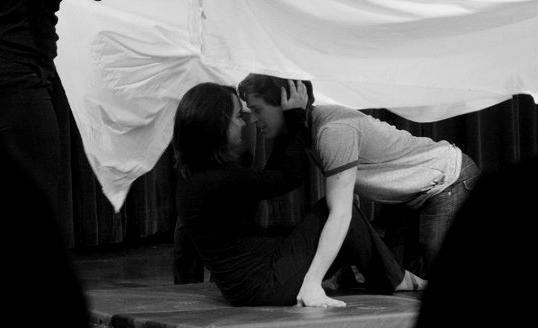
With autism comes a new way of thinking; a fresh eye, a fresh mind. Literally, a completely different wiring of the brain.
Being in front of an audience of 500 or 2,890 people is very easy for me. The roles are incredibly clear, logical, and laid out. I am on stage; you are sitting in the seats watching me. I am playing a character, and that is what you expect, want, and are paying for. The conversations on stage are scripted, and written much better than the ones in my real life. On the street is where conversations are scary—those roles aren’t clear.
Sure, there are lots of things working against me at any given time. For example, one in every sixty-eight Americans is autistic. If all things were equally accessible, you would expect to see one autistic in sixty-eight employees of any company in the United States. Because small talk is so important in current interviews and auditions, this doesn’t happen. But it would happen if things were more accessible. And we can help to make it what we see in the future by acknowledging and realizing that not everyone’s brain is wired the same way; by acknowledging neurodiversity exists.

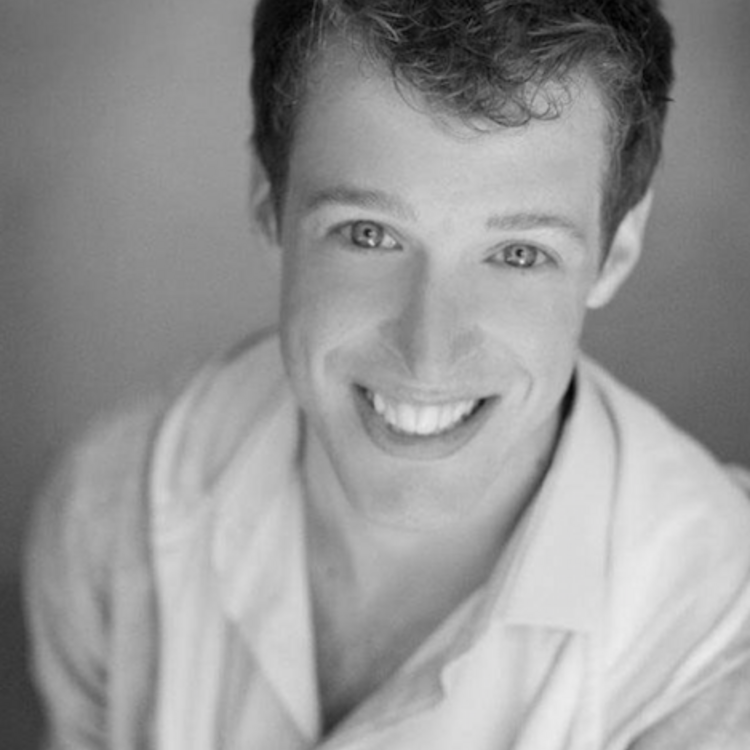
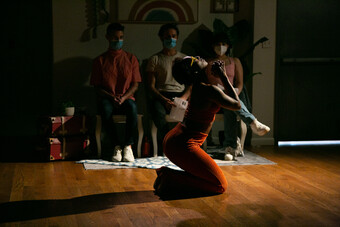

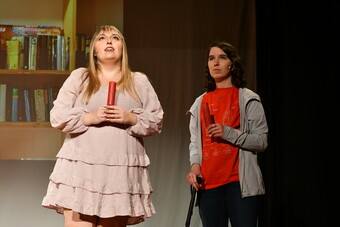

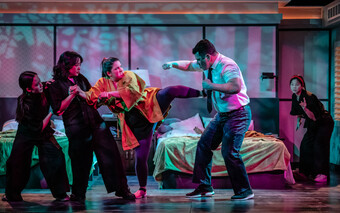



Comments
The article is just the start of the conversation—we want to know what you think about this subject, too! HowlRound is a space for knowledge-sharing, and we welcome spirited, thoughtful, and on-topic dialogue. Find our full comments policy here
Beautifully written, Mickey! Thanks for sharing!
I think it's great that they're working there! Discrimination shouldn't be necessary anywhere, let alone an artistic haven like the theatre
What a great blog! I write for a site called TheMighty.com that this would be perfect for. Would you consider letting us repost it? Please email me at [email protected] so we can discuss it further. Thanks!
Yes, of course. Here's our community's policy on re-posting: "All content is free cultural work available to you under a Creative Commons Attribution 4.0 International License (CC BY 4.0). Attribute the original author (in this case it is: Mickey Rowe) and HowlRound.com when you repost and remix!" Here's further information about the Creative Commons Attribution 4.0 International License: https://creativecommons.org...
Just read your piece and feel for the first time, part of an autistic acting community. I am an autistic actor/coach/parent and especially love Shakespeare to teach and perform. I want to keep the conversation going: rehearsing emotions and the naturalness.of the 'moment' on stage, the clues in Shakespeare for memorization, the 'equal playing field' (according to one commenter), and the hearing-to-memorize, etc. Thank you! !!!
Well, if you approached me with "Wherefore should IStand in the plague of custom, and permit
The curiosity of nations to deprive me . . .
When my dimensions are as well compact,
My mind as generous, and my shape as true . . . [?]" it sure wouild make my day.!By the way, the great playwright Peter Handke is autistic, http://handke-magazin.blogs...
Neurodiversity for the win! I would love to see more actors and companies, both theatrical and other business, embrace this.
Why doesn't the author give his or her name? I'd like to see them perform.
If you're on a larger screen, you'll see his name and a link to his bio in the upper right corner. If you're on a phone, you'll see his name below the title of this post.
Hi FunnyFaceKing. Here is my name and bio. Sorry it's not showing up on your screen. http://howlround.com/author...
Thank you for this! Truly wonderful piece. With Actionplay's work we have seen our students go onto performing arts high schools and careers in the performing arts, and this read was so inspiring.
Thank you so much for sharing this Mickey...
I'm an autistic actor and director, and I love this. I feel like autism can be an asset in theatre. For example, one of the things I have trouble with is summarizing, or the way I often say it, "getting words around an idea". There are lots of things I understand in a very thorough and detailed way, but finding the words to explain my understanding can be next to impossible. But when I'm acting, I don't have to try to explain it in words. I just have to take that understanding and put it into a really fantastic line reading.
As a director, it's my affinity for patterns that really informs my style. Patterns aren't just in math, music, or language -- they're in story devices, writing tropes, and filmmaking technique. I direct for the stage, but setting up a shot and setting up blocking are very similar. I don't write, but when I know why things are written the way they are, I know what to play up and how to make the audience see what I want them to see. I feel like the theatre is where I am supposed to be. The way I work fits perfectly there.
You are amazing Mickey Rowe...thank you for sharing your story. Would you be interested in allowing us to post it on one of our blogs for www.agelessgrace.com - a brain-body fitness program based on the science of neuroplasticity -- and how our brains are wired? My email is [email protected]. You are truly a remarkable human being!
We'd love that. Here's our community's policy about reposting: "All content is free cultural work available to you under a Creative Commons Attribution 4.0 International License (CC BY 4.0). Attribute the original author and HowlRound.com when you repost and remix!"
As a director of youth theatre AND the mother of an autistic son, thank you for this ... my son (8 years old), too, has discovered the theatre, and it's the one place where most skills comes easily to him -- more easily than some of his typical peers: he memorizes instantly and has perfect pitch. He struggles with socialization and sometimes concentrating at rehearsals is a challenge, and I worry sometimes that we should be concentrating more on academics or therapy (we do a lot of both those things anyway). So hearing from the perspective of a beautiful, talented man with autism in the theatre is such an inspiration and an affirmation. Thank you for your story and your perspective.
You put into words what I've been trying to explain to people for years!! I have NLD and a degree in theatre. I love being on stage. I realized at some point that I liked acting classes so much because everyone in the room was analyzing the emotions of the people in the script - not just me! It seemed/seems like a much more level playing field for me plus I learn about typical interactions through the discussions. That was especially helpful when I was growing up.
Wonderful article! I'm forwarding this link to several friends who I know will benefit from this information. Thanks for sharing.
Thanks, my son is 14 on the spectrum he is great on the stage (musicals). I never understood the dichotomy of been able to perform and his shyness on real life. OMG, thanks for helping me understand I will share this with his acting coach.
Thanks for sharing, Mickey. Your example gives me hope that my autistic nephew might find his way and something to love as much as you love acting.
I loved this I am the mother of a 15 year old on the spectrum. My husband and I are both in theatre and she loves going to theatre and getting on stage. I recently directed a musical and one of the actors is autistic. It was a pleasure working with him. Thanks for your words!
This was a super inspiring read. Thank you for sharing!